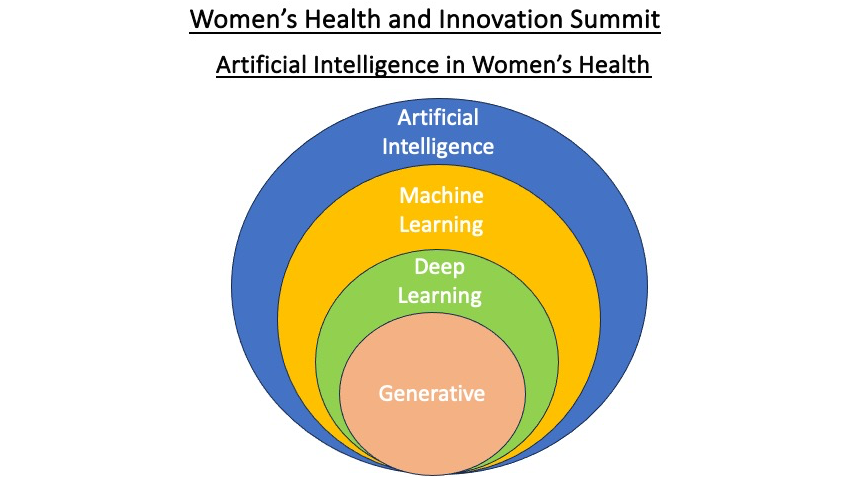Women's Health and Artificial Intelligence (AI)
Women’s Health and Innovation Summit (WHIS) – Boston September 2024
We recently attended the WHIS and were very impressed with the presentations particularly in the area of AI. AI is a game changer for the future of Women’s health. I have put some additional material together below. Many of the attendee’s were involved with start-ups utilising AI, particularly applications associated with imaging, where AI improves the Signal to Noise ratio and enhances the image to provide early detection and treatment for conditions such as endometriosis.
Artificial Intelligence (AI) in Women’s Health: A New Era of Personalized Medicine
Artificial Intelligence (AI) is transforming the healthcare landscape, making it more precise, personalized, and accessible. By leveraging advanced algorithms, machine learning, and data analytics, AI empowers healthcare professionals with tools that improve diagnostics, treatment, and patient care outcomes. For women’s health, AI offers promising applications that can address specific medical needs, enhance early detection, and optimize health management across various stages of life.
What is AI in Healthcare?
AI refers to the use of computer systems that mimic human intelligence to process complex data and make decisions. In healthcare, AI technologies analyze medical data, assist in diagnosis, predict outcomes, and even recommend treatments based on individual patient profiles. AI’s ability to learn from vast amounts of data makes it especially powerful in detecting patterns that may not be visible to the human eye.
Key Applications of AI in Women’s Health
1. Early Detection and Diagnostics
AI is advancing early detection for diseases that disproportionately affect women, such as breast cancer, ovarian cancer, and cervical cancer. AI-powered systems can:
- Enhance mammography screening accuracy by identifying subtle patterns in imaging that human radiologists may miss, reducing false positives and negatives.
- Predict genetic risks for diseases like breast cancer using AI tools that analyze genetic data, allowing for preventive interventions.
- Screen cervical cancer through automated analysis of Pap smear images, enabling faster and more accurate diagnosis in resource-limited settings.
2. Personalized Medicine
Women’s health is uniquely influenced by hormonal cycles, pregnancy, menopause, and other gender-specific factors. AI can:
- Analyze genetic, hormonal, and lifestyle data to offer personalized treatment plans for conditions such as endometriosis, PCOS (polycystic ovary syndrome), and reproductive health.
- Support fertility treatments by predicting optimal times for conception or by improving the outcomes of procedures like IVF (in vitro fertilization) using predictive models.
3. Mental Health and Wellness
AI-powered chatbots and mental health applications are providing women with accessible mental health support, especially for conditions like postpartum depression, anxiety, and stress. These tools offer:
- Real-time emotional support via AI-driven platforms that can assess mood changes, track mental health trends, and provide early intervention.
- Personalized wellness recommendations tailored to an individual's psychological profile and needs.
4. Remote Monitoring and Telemedicine
AI facilitates remote monitoring of women’s health during pregnancy, chronic disease management, and post-surgical recovery. Wearables, combined with AI, can track vital signs, detect abnormalities, and alert healthcare providers to potential risks. For example:
- Gestational diabetes or preeclampsia can be monitored through AI-enabled wearable devices, ensuring timely interventions that can save lives.
- Telemedicine platforms use AI to triage symptoms and provide faster access to care, especially for women in rural or underserved areas.
Addressing Inequities in Women’s Health Through AI
Despite advances in healthcare, women often face disparities in treatment and diagnosis. AI holds the potential to bridge these gaps by:
- Improving access to care for marginalized women who may lack access to specialist care through AI-powered telehealth services.
- Eliminating biases in research and care by training AI systems on diverse datasets that represent women of different ethnicities, ages, and socioeconomic backgrounds. This ensures that treatment algorithms are equitable and effective for all women.
The Future of AI in Women’s Health
As AI continues to evolve, its applications in women’s health will expand. From predictive analytics that forewarn of complications during pregnancy to virtual assistants that guide women through menopause, AI is shaping a future of healthcare that is more responsive, personalized, and preventative.
For women, this means more empowered health decisions, earlier interventions, and a greater understanding of their bodies across all stages of life. The partnership between women’s health experts and AI technologies can create a healthcare ecosystem that prioritizes precision care, equity, and accessibility for all.
This intersection of AI and women’s health marks a significant step toward a new era of healthcare, where technology empowers women to live healthier, more informed lives. The future is bright, and AI is paving the way.
We look forward to WHIS September 2025, as we are certain AI applications will have advanced dramatically by this time.










